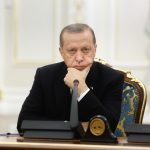Shortly before Christmas, President Trump spoke with Recep Tayyip Erdoğan. The Turkish ruler promised Trump that U.S. forces were no longer needed inside Syria as Turkey would fight the Islamic State. Trump may not have realized Erdoğan’s insincerity: Erdoğan was complicit in the Islamic State’s rise and sustenance, as both intelligence and forensic evidence revealed. “Our troops are coming home!” Trump tweeted.
The sudden shift in U.S. policy led both Defense Secretary James Mattis and Special Envoy Brett McGurk to resign, but in subsequent weeks senior national security and defense officials convinced Trump to slow the withdrawal, if not change his mind completely. The reason to keep U.S. troops in eastern Syria is clear: Maintaining a small presence is a deterrent from other groups from filling the vacuum. A small U.S. contingent, for example, disrupts the so-called land bridge by which Iran’s Islamic Revolutionary Guard Corps sends fighters and supplies across Iraq and into Syria and Lebanon. A small presence is also important for intelligence gathering. Most importantly, a U.S. “trip wire” prevents other countries like Turkey from invading the area.
Turkey, of course, wants the United States to depart Syria so that Turkey can have free rein to target the Syrian Kurds and the self-governing entity they have established inside Syria. Simply put, Turkey’s decades-long history combating a Kurdish insurgency at home, combined with rampant racism in Turkey’s leadership, has left Turkish authorities unable or unwilling to differentiate between the peaceful expression of Kurdish identity and terrorism. This is one of the reasons why, after Erdoğan ordered Turkish forces into Syria’s Afrin district (despite never having identified a single terrorist event directed from there), Turkish authorities razed Kurdish houses, dug up graveyards, and knocked down statues, all the while ethnically cleansing the district’s population.
The U.S. is invested in protecting the Kurds, however. Syrian Kurdish militias were single-handedly the most successful groups combating al Qaeda and the Islamic State inside Syria. While the Obama administration initially kept Syria’s Kurds at arm’s length in order to win Turkey’s cooperation against the Islamic State, Turkey’s double game eventually convinced U.S. authorities that they had no choice but to work directly with the Syrian Kurds. To abandon the Kurds to Turkey would be to invite slaughter for Kurds who have nowhere else to go. It would also signal to all current and future U.S. partners that the U.S. does not stand by allies.
With the U.S. withdrawal from Syria off the table for now, and with the Turks recognizing that they cannot make an end-run against U.S. interests, negotiations now center on a buffer zone inside Syria to keep Kurdish forces away from the Turkish border. A buffer zone to separate the Turkish military and Kurdish forces might be a good idea, but if it is to succeed in its stated purpose rather than simply be cover for renewed Turkish ethnic cleansing, it should be on the Turkish side of the border rather than inside Syria.
In the 1980s and 1990s, the Turkish army razed thousands of Kurdish villages on the Turkish side of the border as part of Ankara’s counter-terrorism strategy and in order to create a cordon sanitaire to hamper insurgent and terrorist infiltration from Syria and safe haven within Kurdish villages. The destruction of those towns and villages sent millions of Kurds fleeing to Istanbul, Ankara, Izmir, and other major Turkish cities. There was no corollary destruction of Kurdish population centers inside Syria, however, many of which hug the Turkish border.
In effect, to welcome any safe-zone in Syria is to do to Kurdish towns and villages there what the Turkish military did in its own territory more than a quarter-century ago. Add into the mix that the drive for the buffer zone is fueled more by Ankara’s irrationality and Erdoğan’s desire to distract from his own economic failings and there simply is no reason to make the Kurds pay the price.
If Turkey wants a buffer, the U.S. position should be clear: The Turkish army should withdraw from Syria, and evacuate perhaps 10 kilometers from the Syrian border in favor of international observers. If that might sound outrageous to the Turkish audience, then perhaps they should consider how their own demands appear outside those trapped within the Turkish media bubble.
By
Michael Rubin (@Mrubin1971) is a contributor to the Washington Examiner’s Beltway Confidential blog. He is a resident scholar at the American Enterprise Institute and a former Pentagon official.
Source: Washington Examiner



